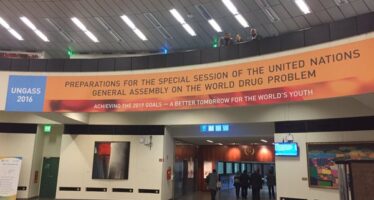Slovak government urged to end segregation for Romani children
![]()
Slovak government urged to end segregation for Romani children
How Romani children are discriminated against in the Slovak education system
Thousands of Romani children in Slovakia receive a substandard education
Amnesty International has urged the Slovak government to immediately end the segregation of Romani children in the country’s education system.
This practice leaves thousands of Romani pupils in substandard education in schools and classes for pupils with “mild mental disabilities” or ethnically segregated mainstream schools and classes.
In a briefing to the Slovak government, Steps to end segregation in education, Amnesty International points to serious gaps in the enforcement and monitoring of the ban on discrimination and segregation in the Slovak educational system.
“Romani children across Slovakia remain trapped in a school system that keeps failing them as a result of widespread discrimination. It deprives Romani children of equal opportunities and sentences them to a life of poverty and marginalization,” said David Diaz-Jogeix, Amnesty International Europe and Central Asia Deputy Director.
“The Slovak government has much to do to end the segregation that has an impact on a large part of the country’s population. Segregation in education means a life-long stigma for children whose future chances are brutally limited. It is a practice that does not belong to 21st century Europe and must be eliminated.”
Segregation of Romani children takes various forms: special schools or special classes within mainstream schools designed for pupils with “mild mental disabilities” and mainstream Roma-only schools and classes.
While Roma are estimated to comprise less than 10 per cent of Slovakia’s total population, they make up 60 per cent of the pupils in special schools, according to a 2009 survey.
In regions with high Romani populations three out of every four pupils in special schools are Roma. Eighty five per cent of the children in special classes in mainstream schools across the country are Roma.
The causes of segregation are complex and include entrenched anti-Roma attitudes as well as policy failures in the education system such as early and flawed child assessment and insufficient support for Romani children within mainstream education.
Widespread anti-Romani sentiment across the country expressed by non-Roma parents and educational professionals, has also led to segregation of Romani children even in mainstream schools and classes.
This has led to a situation in which Romani children are sometimes literally locked into separate classrooms, corridors or buildings to prevent them from mixing with non-Roma pupils.
The coalition government’s programme adopted in August 2010, included the commitment to eliminate segregated schooling of Roma.
Amnesty International said it is concerned that this has not been followed by a clear and unequivocal statement by the head of government that ethnic discrimination and segregation of Roma is unacceptable and will be combated as a matter of priority.
“The idea that separate can be equal has been discredited. Slovakia cannot continue to deny its Romani children their right to education without discrimination,” David Diaz-Jogeix said.
“The choices that the government makes now will affect the lives of thousands of Romani children. The government holds the key to allow the Roma in Slovakia full participation in Slovak and European society.”
Amnesty International called on the Slovak authorities to:
- Provide the State School Inspectorate with adequate resources, including robust, detailed guidelines and procedures on how to identify, monitor and combat segregation in practice;
- Begin the systematic collection of data on education, disaggregated on the basis of gender and ethnicity;
- Introduce a clear duty on all schools to desegregate education and provide them with effective support;
- Introduce adequate support measures for Roma and non-Roma children who need extra assistance, so that they may achieve their fullest potential within mainstream schools.
This work is part of Amnesty International’s Demand Dignity campaign which aims to end the human rights violations that drive and deepen global poverty.
Related Articles
Italy: Roma segregation camps – a blight on the City of Rome
![]()
More than 4,000 Roma living in authorized camps in Rome have been systematically discriminated against © Amnesty International Roma in
Suspicions Destroyed Lives of Victims’ Relatives
![]()
Neo-Nazi Terror Cell Ufuk Ucta/ DER SPIEGEL Most of the victims of the Zwickau terror cell were small business owners
Global Rights. UNGASS, it is time to stop the war on drugs
![]()
From 19 to 21 April 2016 the United Nations will host in New York a special session of the General Assembly on drugs (UNGASS)




